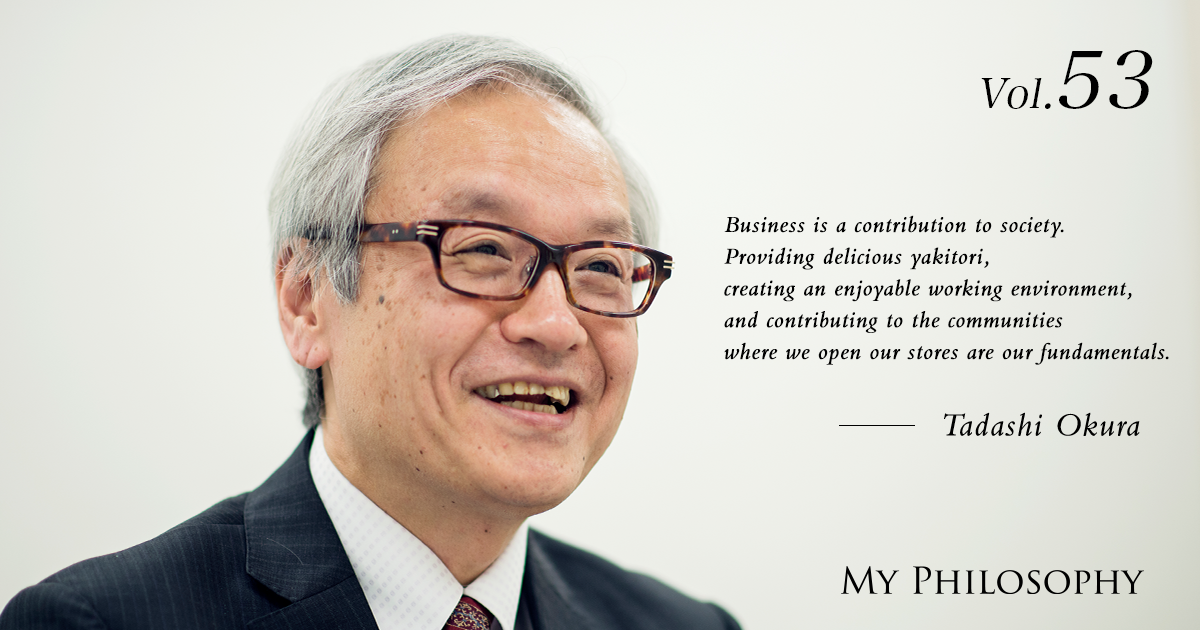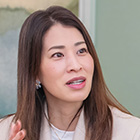
Mr. Tadashi Okura, President and CEO of Torikizoku, a nationwide yakitori chain known for its "Uniformly Impressive at 280 Yen" concept. We spoke with him about his views on work and his future goals, as he has grown his company to the level of a publicly traded entity on the First Section of the Tokyo Stock Exchange.
Profile
Vol.53 Tadashi Okura
President and CEO of Torikizoku Co., Ltd.
Born in Osaka Prefecture in 1960, he graduated from a culinary school and worked as a waiter for three years at a hotel after graduation. In 1982, he left the hotel to work at a yakitori restaurant. In 1985, at the age of 25, he opened the first Torikizoku restaurant in Higashi-Osaka City. In 1986, he established Eternal Service Co., Ltd. (now Torikizoku Co., Ltd.) and became its President and CEO. In 2005, he expanded to Tokyo. The company was listed on JASDAQ in 2014, on the 2nd Section of the Tokyo Stock Exchange in 2015, and on the 1st Section in 2016. As of the end of May 2017, there were 541 stores (319 directly managed and 222 TCC stores). *TCC stands for Torikizoku Comrade Chain.
*Titles and other information are as of the time of the interview (May 2017).
Yakitori Passion
 Torikizoku aims to become the world’s best yakitori restaurant, with a goal of 2,000 stores. Achieving this goal will be challenging unless we become an essential part of the dining infrastructure, surpassing traditional izakayas. Many once-popular restaurants have declined over time, and our challenge lies in avoiding this fate. To become a vital presence, we avoid adding superficial value. Fancy interiors or unique customer service gimmicks eventually lose their appeal, so we focus on refining the basic aspects of a restaurant.
One such aspect is “kushi-uchi” (skewering). Instead of centrally processing and freezing chicken at a factory, we skewer the chicken at each restaurant. This practice, driven by our “yakitori passion” and “pride,” prioritizes delicious yakitori over profitability. It would be unfortunate if our employees couldn’t sell our yakitori to customers with pride. Low prices shouldn’t mean low quality; if our yakitori were cheap but tasteless, our employees wouldn’t be happy. This is not just idealism or profit-driven; we prioritize thinking from the customer’s perspective.
Torikizoku aims to become the world’s best yakitori restaurant, with a goal of 2,000 stores. Achieving this goal will be challenging unless we become an essential part of the dining infrastructure, surpassing traditional izakayas. Many once-popular restaurants have declined over time, and our challenge lies in avoiding this fate. To become a vital presence, we avoid adding superficial value. Fancy interiors or unique customer service gimmicks eventually lose their appeal, so we focus on refining the basic aspects of a restaurant.
One such aspect is “kushi-uchi” (skewering). Instead of centrally processing and freezing chicken at a factory, we skewer the chicken at each restaurant. This practice, driven by our “yakitori passion” and “pride,” prioritizes delicious yakitori over profitability. It would be unfortunate if our employees couldn’t sell our yakitori to customers with pride. Low prices shouldn’t mean low quality; if our yakitori were cheap but tasteless, our employees wouldn’t be happy. This is not just idealism or profit-driven; we prioritize thinking from the customer’s perspective.
Enjoying Work
 I have no worries. There are always challenges, but they are resolved through continuous effort. Since I aimed to expand nationwide from the start of my business, I struggled when things didn’t go as planned. Business doesn’t always run smoothly. When things don’t go well, I see it as an opportunity for growth. Over the years, I have come to enjoy everything. I want to manage with joy and live happily. I also want my staff to enjoy their work. When I visit our stores, people ask what I look at, and my answer is the staff’s expressions. If the staff are smiling, the customers will definitely be smiling too. The most important thing is whether the staff are working happily. If they look exhausted or uninterested, I see it as the company’s responsibility.
I believe that people can fully utilize their potential, including latent abilities, in a pleasant and enjoyable working environment. Therefore, I don’t get angry emotionally. This approach is influenced by my experiences as a baseball player in my youth. There was a classmate who would get angry when someone made an error, making it less fun for everyone to play. Additionally, our team’s coach during the Osaka Prefectural Tournament was very strict, causing everyone to play fearfully, leading to more errors. This made baseball, which I loved, no longer enjoyable. During my time working at a hotel, the staff worked in fear of being scolded by a strict supervisor. Strictness is fine, but without enjoyment, work can’t be sustained and it’s hard to love the job. At that moment, I decided that when I was in a leadership position, I would ensure that my staff enjoyed their work. However, I do expect results. I consider it as an enjoyable pressure towards a set big goal (laughs). While someone in the organization needs to talk about numbers, I try not to focus too much on profits. Our goal is to contribute to society, and profit is merely a means to that end.
I have no worries. There are always challenges, but they are resolved through continuous effort. Since I aimed to expand nationwide from the start of my business, I struggled when things didn’t go as planned. Business doesn’t always run smoothly. When things don’t go well, I see it as an opportunity for growth. Over the years, I have come to enjoy everything. I want to manage with joy and live happily. I also want my staff to enjoy their work. When I visit our stores, people ask what I look at, and my answer is the staff’s expressions. If the staff are smiling, the customers will definitely be smiling too. The most important thing is whether the staff are working happily. If they look exhausted or uninterested, I see it as the company’s responsibility.
I believe that people can fully utilize their potential, including latent abilities, in a pleasant and enjoyable working environment. Therefore, I don’t get angry emotionally. This approach is influenced by my experiences as a baseball player in my youth. There was a classmate who would get angry when someone made an error, making it less fun for everyone to play. Additionally, our team’s coach during the Osaka Prefectural Tournament was very strict, causing everyone to play fearfully, leading to more errors. This made baseball, which I loved, no longer enjoyable. During my time working at a hotel, the staff worked in fear of being scolded by a strict supervisor. Strictness is fine, but without enjoyment, work can’t be sustained and it’s hard to love the job. At that moment, I decided that when I was in a leadership position, I would ensure that my staff enjoyed their work. However, I do expect results. I consider it as an enjoyable pressure towards a set big goal (laughs). While someone in the organization needs to talk about numbers, I try not to focus too much on profits. Our goal is to contribute to society, and profit is merely a means to that end.
For Sustainability
 When I founded the company 32 years ago, I demanded that our executives work harder than anyone else. I believed that working harder than others would lead to personal growth and was a condition for our success. However, a short-term “keep pushing” mentality does not lead to sustainability. As the goal of going public became tangible, I realized that our current working conditions were insufficient. To improve productivity, it is important to create an environment where people can work for a long time and work efficiently. In Japan, there is a cultural tendency to not go home until your colleagues do. Once, an executive told me, “If the president doesn’t take a break, we can’t either.” So, I started taking proper vacations and reduced my working hours. I ensure I always take weekends off and do not work more hours than my employees.
As we gradually improved the working environment, one executive questioned whether people could grow in such a “lukewarm” environment. I responded, “This is not lukewarm. It’s about working efficiently and enhancing productivity within the proper working hours.” Within the set time, everyone should focus on personal growth and self-improvement. I use the newly available time to meet various people and gather diverse information.
When I founded the company 32 years ago, I demanded that our executives work harder than anyone else. I believed that working harder than others would lead to personal growth and was a condition for our success. However, a short-term “keep pushing” mentality does not lead to sustainability. As the goal of going public became tangible, I realized that our current working conditions were insufficient. To improve productivity, it is important to create an environment where people can work for a long time and work efficiently. In Japan, there is a cultural tendency to not go home until your colleagues do. Once, an executive told me, “If the president doesn’t take a break, we can’t either.” So, I started taking proper vacations and reduced my working hours. I ensure I always take weekends off and do not work more hours than my employees.
As we gradually improved the working environment, one executive questioned whether people could grow in such a “lukewarm” environment. I responded, “This is not lukewarm. It’s about working efficiently and enhancing productivity within the proper working hours.” Within the set time, everyone should focus on personal growth and self-improvement. I use the newly available time to meet various people and gather diverse information.
A Life of Constant Goals
 “I will go forward with yakitori alone.” I made this decision because pursuing one thing suits my personality. For example, some people love cars, own several, and switch every few years. But I’m the type who cherishes one car for a long time. Observing various companies, I’ve seen that when business is good, they diversify and invest. Then, when the economy worsens, they return to their core business, repeating this cycle. I believe that sticking confidently to one’s main business is more efficient. My entry into the restaurant industry began with my first part-time job. During my second and third years of high school, I worked at a beer garden. I decided that if I could work in this industry in the future, I would live a happy life. Once I made this decision, I focused solely on it. Though I worked with five classmates, I was the only one who entered the restaurant industry.
Currently, I’m considering expanding into Europe and the United States. While China’s food service market is large, the overall scale of the food service market in Asia is small relative to its population. For our company, opening chain stores allows us to contribute to the people of that country. Specialty stores are only accepted in relatively mature societies. Expanding chains in well-developed areas allows us to showcase our strengths and contribute locally. Thus, advanced countries are our primary focus. In Japan, we use Japanese ingredients, and overseas, we use local ingredients, which is fundamental to Torikizoku. We believe that if we don’t contribute to the country we expand into, we won’t be able to sustain our presence.
Before reaching 2,000 stores, we have set a goal of 1,000 stores by the end of the fiscal year ending July 2021, coinciding with the Tokyo Olympics and Paralympics. Isn’t it wonderful to always have a goal to strive for? It would be sad to end when you are satisfied with having achieved your goals. Having a big goal allows you to constantly push forward. It would be ideal to die while still chasing after what you aim for.
“I will go forward with yakitori alone.” I made this decision because pursuing one thing suits my personality. For example, some people love cars, own several, and switch every few years. But I’m the type who cherishes one car for a long time. Observing various companies, I’ve seen that when business is good, they diversify and invest. Then, when the economy worsens, they return to their core business, repeating this cycle. I believe that sticking confidently to one’s main business is more efficient. My entry into the restaurant industry began with my first part-time job. During my second and third years of high school, I worked at a beer garden. I decided that if I could work in this industry in the future, I would live a happy life. Once I made this decision, I focused solely on it. Though I worked with five classmates, I was the only one who entered the restaurant industry.
Currently, I’m considering expanding into Europe and the United States. While China’s food service market is large, the overall scale of the food service market in Asia is small relative to its population. For our company, opening chain stores allows us to contribute to the people of that country. Specialty stores are only accepted in relatively mature societies. Expanding chains in well-developed areas allows us to showcase our strengths and contribute locally. Thus, advanced countries are our primary focus. In Japan, we use Japanese ingredients, and overseas, we use local ingredients, which is fundamental to Torikizoku. We believe that if we don’t contribute to the country we expand into, we won’t be able to sustain our presence.
Before reaching 2,000 stores, we have set a goal of 1,000 stores by the end of the fiscal year ending July 2021, coinciding with the Tokyo Olympics and Paralympics. Isn’t it wonderful to always have a goal to strive for? It would be sad to end when you are satisfied with having achieved your goals. Having a big goal allows you to constantly push forward. It would be ideal to die while still chasing after what you aim for.
Tadashi Okura President and CEO of Torikizoku Co., Ltd.
I love yakitori. It was my passion for yakitori and the courage to act on it that led me to meet President Tadashi Okura. Under the eternal philosophy of “brightening the world through yakitori,” Torikizoku, with its “proudly in progress” signs in all stores, has grown to 541 locations as of the end of May 2017. While it took 23 years to reach 100 stores, the next 100 stores were achieved in just 3 years. Now, they are opening almost one store per week. Listening to Mr. Okura, I reaffirmed that building a foundation and systematizing things requires both persistence and consistency. Inspired by President Okura’s “enjoyable pressure,” I am eager to take more actions. Over the past 10 years, “My Philosophy” has brought me 50 invaluable encounters that have been essential to my growth. With a high aspiration of reaching 1,000 interviews, I will continue to seek out and directly approach outstanding individuals, delivering high-quality interview content.
May 2017, at Torikizoku’s Tokyo office.Translated by ILI Inc.





































































































































